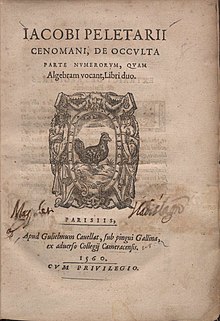Jacques Peletier
Jacques Peletier , also Jacques Peletier du Mans, (* July 25, 1517 Le Mans ; † July 1582 Paris ), in Latinized form Jacobus Peletarius , was a French man of letters , humanist, lawyer, physician and mathematician. He was in contact with numerous writers and scholars of the era. However, his attempts to reform French orthography in the sense that it should follow phonetic rather than etymological criteria were unsuccessful . H. to write the words roughly as they were spoken.
Live and act
Peletier was the son of a lawyer Pierre Pelletier and his wife, born Jeanne le Royer from Le Mans. He studied philosophy at the Collège de Navarre in Paris and five years law at Le Mans. In the 1530s he was secretary to the Bishop of Le Mans, but then turned away from a career as a lawyer and studied Greek, medicine and mathematics by himself. In 1541 he published a French translation of Horace's Ars Poetica . In his efforts to write French, he pursued goals similar to those of the poet group Pléiade. In 1543 he was rector of the College de Bayeux in Paris, which he gave up in 1547 for a free existence while traveling, where he worked as a surgeon and mathematics teacher. In addition to Paris, he was in Bordeaux, Basel, Poitiers and Lyon. He published French volumes of poetry, some of them based on Lucretius with scientific subjects, mathematical works (in French and Latin) and smaller works on medicine.
His edition of the first six books of the elements of Euclid led to disputes with Christophorus Clavius and Johannes Buteo, in particular over horn-shaped angles (Book 3, Proposition 16 of the Elements) and the use of the superposition principle (Axiom 4 in Book 1, What is Coincident is Equal and Book 1, Proposition 4). He translated Gemma Frisius , wrote a similar book on the practical application of arithmetic, and was influenced in his algebra by Gerolamo Cardano and Michael Stifel .
In 1572 he was briefly at the Collège de Guyenne in Bordeaux. During this period he made the acquaintance of Michel de Montaigne and Pierre de Brach . In 1579 he went back to Paris where he was promoted to rector of the College of Le Mans.
Mathematical writings
- Arithmeticae practicae methodus facilis per Gemmam Frisium , huc accesserunt Peletarii annotationes. Paris 1545 (with further editions from 1549 to 1557).
- L'arithmétique departie en quatre livres. Poitiers 1549 (and other editions).
-
L'algebre departie en deus livres. Lyon 1545. 3rd edition: 1620.
- Latin edition: De occulta parte numerorum. Paris 1560.
-
Euclidis elementa geometrica demonstrationum libri sex. Lyon 1557. 2nd edition: Geneva 1610 (French translation: Geneva 1611).
- Latin edition of the first six books of the elements with commentary, in the 2nd edition also the Greek text of definitions and propositions.
- Commentarii tres, primus de dimensione circuli, secundus de contactu linearum, tertius de constitutione horoscopi. Basel 1563 (the second part also appeared in Paris in 1581).
- Disquisitiones geometricae. Lyon 1567.
- C. Clavium de contactu linearum apologia. Paris 1579.
literature
- JC Poggendorff : Biographical-literary concise dictionary for the history of the exact sciences , second volume, page 389; online at Google Books
- JJ Verdonk Jacques Peletier , in Dictionary of Scientific Biography
- C. Jugé: Jacques Peletier du Mans , Paris 1907.
- Luigi Maierù: “... in Christophorum Clavium de Contactu Linearum Apologia” Considerazioni attorno alla polemica fra Peletier e Clavio circa l'angolo di contatto (1579–1589) , Archive for the History of Exact Sciences, 41, 1990, 115–137
Individual evidence
- ^ On this Thomas Heath The thirteen books of Euclids Elements , Cambridge 1908, Volume 1, p. 249
| personal data | |
|---|---|
| SURNAME | Peletier, Jacques |
| ALTERNATIVE NAMES | Peletarius, Jacobus; Peletier du Mans, Jacques |
| BRIEF DESCRIPTION | French man of letters, humanist, lawyer, physician and mathematician |
| DATE OF BIRTH | July 25, 1517 |
| PLACE OF BIRTH | Le Mans |
| DATE OF DEATH | July 1582 |
| Place of death | Paris |

